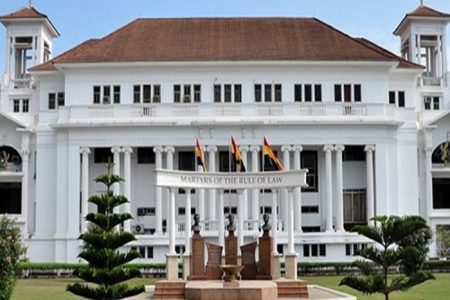The Supreme Court, in a 5-2 majority decision, has upheld the Food and Drugs Authority’s (FDA) directive banning celebrities from endorsing alcoholic beverages.
The landmark ruling, presided over by Chief Justice Gertrude Sackey Torkornoo, concluded that the FDA’s guidelines were neither excessively unreasonable nor in violation of the 1992 Constitution.
“The plaintiff’s action therefore fails and there would be no order as to cost because the issue is a novel one,” stated the Court, dismissing the suit against the FDA.
The directive, issued by the FDA in 2015, aimed to protect minors and ensure public health safety by prohibiting well-known personalities or professionals from advertising alcoholic drinks. The FDA asserted that such endorsements could negatively influence youth and contribute to alcohol abuse.
Mark Darlington Osae, an artiste manager, challenged the FDA’s directive, arguing that it violated principles of equality and was discriminatory against the creative industry.
Osae filed the lawsuit on November 11, 2022, contending that the directive would deprive celebrities and the entertainment industry of potential income.
Osae’s argument centered on Articles 17 (1) and (2) of the 1992 Constitution, which guarantee equality and prohibit discrimination based on social or economic status, occupation, among other grounds.
He sought the Supreme Court’s declaration that the FDA’s directive was unconstitutional and requested an injunction to prevent the enforcement of the guidelines.
The plaintiff further demanded a proper interpretation of Articles 17 (1) and (2) and an order striking down the FDA’s advertisement guidelines. He also sought a perpetual injunction against the FDA, barring it from preventing any celebrity from advertising alcoholic drinks.
Mr. Joseph Bennie, Director of Legal and Corporate Affairs at the FDA, emphasized the importance of well-known personalities in protecting the youth from alcohol abuse.
He expressed the FDA’s hope that celebrities would partner with the Authority in advocating against alcoholism.
“We do not agree with the Supreme Court decision, but there is nothing we can do. We really want to dialogue with the FDA to know what to do or what not to do because as of now, alcoholic companies continue to sponsor shows,” said Nii Foli Yartey, a friend of the plaintiff and President of the Ghana Music Alliance, addressing journalists after the ruling.
The decision underscores the ongoing debate over the role of public figures in advertising and the balance between public health concerns and economic interests within the entertainment industry.
- Tuesday, April 8, 2025 Newspaper Headlines - 8 April 2025
- Mass layoffs rock Ghana Maritime Authority - 7 April 2025
- Armed National Security officers vandalise residence of Bawumia’s aide - 7 April 2025

